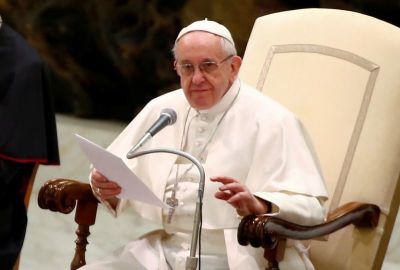Pope Francis’ anti-biblical and anti-scientific notion of 'ecological sin'

Pope Francis wants “ecological sin” included as a category of sin in the Roman Catholic Church’s official catechism.
“We have to introduce … in the catechism of the Catholic Church, the sin against ecology, the sin against our common home, because it’s a duty,” the Pope said.
Climate change is a favorite issue for Pope Francis. It is almost certain that it will be a major aspect of the catechism on “ecological sin.”
But his understanding of environmental care and climate change is bankrupt theologically and scientifically. Here is why.
Why Is the Pope’s Idea Anti-Biblical?
The Bible calls for man to be a good steward of the environment. That means tending the garden and, simultaneously, using natural resources for the betterment of mankind.
Popular environmentalist opinion opposes this. Many environmentalists view humans as the problem. They call us a cancer, a plague, people pollution, the population bomb. They blame us for resource exhaustion and ecological degradation.
Fears of dangerous manmade climate change make this radical philosophy more popular. It is now a dominant viewpoint in the news and entertainment media and among politicians.
Radical environmentalists want to ban fossil fuels. The Pope supports the viewpoints of these radical environmentalists on climate change and natural resource use.
His decision to join the climate alarmist bandwagon sets him in opposition to the Bible’s emphasis on protecting the poor and enabling them to rise out of poverty.
Fossil fuels are indispensable to eliminating poverty in many poor countries. None of the developed countries could have risen out of poverty without them. To abandon them is to make poor people suffer longer.
Why Is the Pope’s Stance Anti-Science?
The Pope and others justify their agenda by saying climate change will destroy our world. But can that claim be scientifically defended? The answer exposes why the Pope’s position on climate change is against science.
The real-world climate differs starkly from that rampant in the media. There has been no dangerous increase in global average temperatures. Many of the alarmists’ predictions have been falsified.
The global lower troposphere warming rate 1979–2019 was just 0.13 degree Celsius per decade, half of what the CMIP5 computer climate models predicted.
Be it an ice-free Arctic or the collapse of polar bear populations or the increase in extreme weather events, alarmists’ claims have failed repeatedly.
The Pope’s appeal to consensus about climate change is antithetical to scientific methodology. Science relies on evidence-based verification of hypotheses, not vote counting.
The modern consensus on climate change—a consensus that does not include all climate scientists—is uncomfortably similar to the flat-earth theory. Climate doomsayers firmly believe a catastrophe is imminent. They suppress evidence to the contrary, even banning it from academic circles.
Just when our world was becoming scientifically progressive, climate doomsayers have hijacked academia. Worse, they advocate for policies that would trap billions in poverty.
E. Calvin Beisner is founder and national spokesman of the Cornwall Alliance for the Stewardship of Creation. He states, after listing five reasons to think so, that “belief in ‘climate change’ (shorthand for dangerous manmade warming that must be mitigated even at the cost of trillions of dollars and potentially trapping billions in poverty) really is a leap of faith.”
The Pope’s opinion on climate change is a product of blind faith. It is not based on evidence. The proposed actions to curb climate change cannot be justified by empirical science.
The new teaching on “ecological sin” may be the most anti-scientific and anti-developmental pseudo-Biblical policy to come from the Vatican in this century. Not only Protestants but also Roman Catholics should oppose it.
Vijay Jayaraj (M.Sc., Environmental Science, University of East Anglia, England), is a Research Contributor for the Cornwall Alliance for the Stewardship of Creation.





















